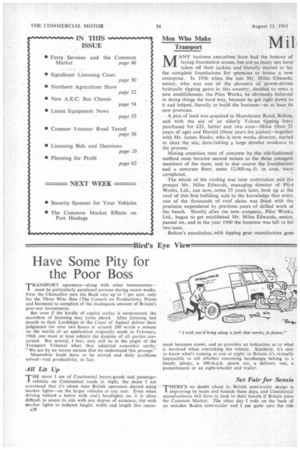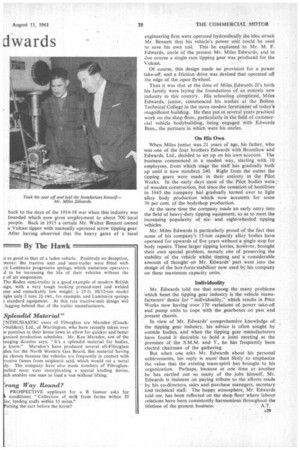M dwards
Page 30

Page 31

If you've noticed an error in this article please click here to report it so we can fix it.
MANY business executives have bad the honour of laying foundation stones, but not so many can have taken off their jackets and literally started to lay the complete foundations for premises to house a new enterprise. In 1936 when the late Mr. Miles Edwards, senior, who was one of the pioneers of power-driven hydraulic tipping gears in this country, decided to erect a new establishment, the Pilot Works, he obviously believed in doing things the hard way, because he got right down to it and helped, literally to build the business—or at least its new premises.
A plot of land was acquired in Manchester Road, Bolton, and with the aid of an elderly Vulcan tipping lorry purchased for £25, father and two sons—Miles (then 21 years of age) and Harold (three years his junior)—together with Mr. James Banks, who is now works director, started to clear the site, demolishing a large derelict residence in the process.
Mixing countless tons of concrete by the old-fashioned method soon became second nature to the three youngest members of the team, and in due course the foundations and a concrete floor, some 12,000-sq.-ft. in area, were completed.
The whole of the roofing was later undertaken and the present Mr. Miles Edwards, managing director of Pilot Works, Ltd., can now, some 25 years later, look up at the roof of this first building, safe in the knowledge that every. one a the thousands of roof slates was fitted with the precision engendered by previous years of skilled work at the bench. Shortly after the new company, Pilot Works, Ltd., began to get established Mr. Miles Edwards, senior, passed on, and in the year 1940 the business was left to his two sons.
Bolton's association with tipping gear manufacture goes back to the days of the 191448 war when this industry was founded which now gives employment to about 700 local people. Back in 1915 a certain Mr. Walter Bennett owned a Vulcan tipper with manually operated screw tipping gear. After having observed that the heavy gates of a local
engineering firm were operated hydraulically the idea struck Mr. Bennett that his vehicle's power unit could be used to save his own toil. This he explained to Mr. M. F. Edwards, uncle of the present Mr. Miles Edwards, and in clue course a single ram tipping gear was produced for the Vulcan.
Of course, this design made no provision for a power take-off, and a friction drive was devised that operated off the edge of the open flywheel.
Thus it was that at the time of Miles Edwards II's birth his family were laying the foundations of an entirely new industry in this country. His schooling completed, Miles Edwards, junior, commenced his studies at the Bolton Technical College in the more modest forerunner of today's magnificent building. He then put in several years practical work on the shop floor, particularly in the field of commercial vehicle bodybuilding, being engaged with Edwards Bros., the partners in which were his uncles.
On His Own When Mlles junior was 21 years of age, his father, who was one of the four brothers Edwards with Bromilow and Edwards, Ltd., decided to set up on his own account. The business commenced in a modest way, starting with 10 employees, from which stage the staff has gradually built up until it now numbers 240. Right from the outset the tipping gears were made in their entirety in the Pilot Works. In the early days most of the Pilot bodies were of wooden construction, but since the cessation of hostilities in 1945 the company hag gradually turned over to light alloy body production which now accounts for some 70 per cent. of the bodyshop production.
At the same time the company made an early entry into the field of heavy-duty tipping equipment, so as to meet the increasing popularity of sixand eight-wheeled tipping vehicles.
Mr. Miles Edwards is particularly proud of the fact that some of his company's 15-ton capacity alloy bodies have operated for upwards of five years without a single stop for body repairs. These larger tipping lorries, however, brought their own special problem, namely one of preserving the stability of the vehicle whilst tipping and a considerable amount of thought on Mr. Edwards' part went into the design of the box-fornrstabilizer now used by his company on these maximum capacity units.
Individuality Mr. Edwards told me that among the many problems which beset the tipping gear industry is the vehicle manufacturers' desire for "individuality," which results in Pilot Works now having over 170 variations of power take-off and pump units to cope with the gearboxes on past and present chassis.
In view of Mr. Edwards' comprehensive knowledge of the tipping gear industry, his advice is often sought by outside bodies, and when the tipping gear manufacturers have found it desirable to hold a joint meeting at the premises of the S.M.M. and T., he has frequently been elected chairman of the gathering.
But when one asks Mr. Edwards about his personal achievements, his reply is more than likely to emphasize the value that the existing team-spirit has brought to his organization. Perhaps, because at one time or another he has carried out so many of the jobs himself, Mr. Edwards is insistent on paying tribute to the efforts made by his co-directors, sales and purchase managers, secretary and technical staff. The happy atmosphere, Mr. Edwards told me, has been reflected on the shop floor where labour relations have been consistently harmonious throughout the
lifetime of the present business. A.T.




















































































































